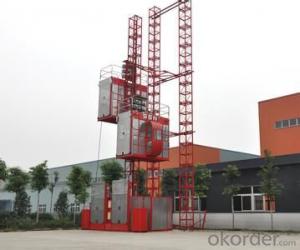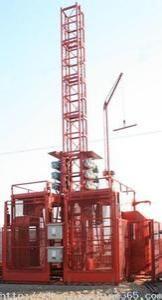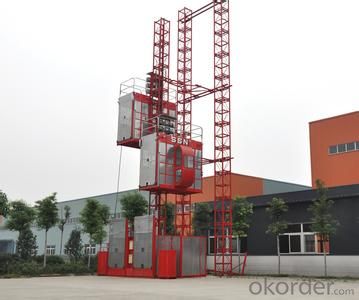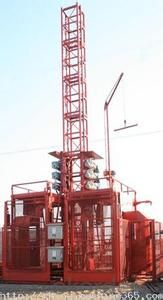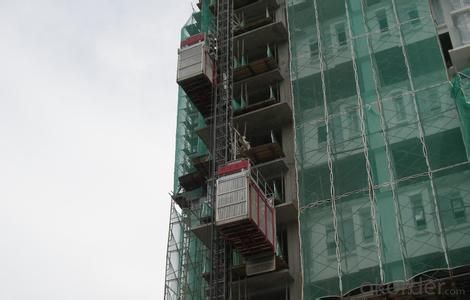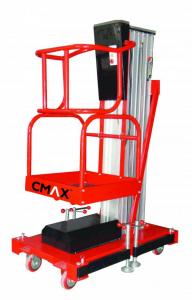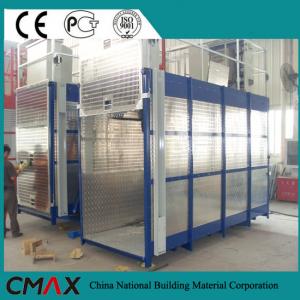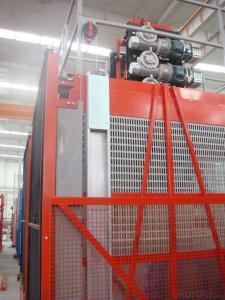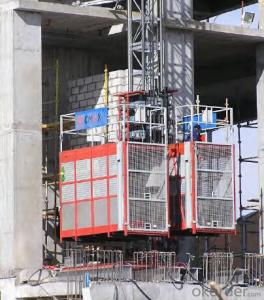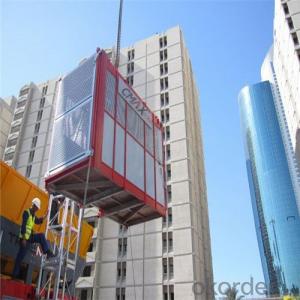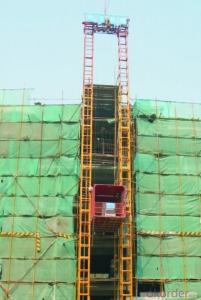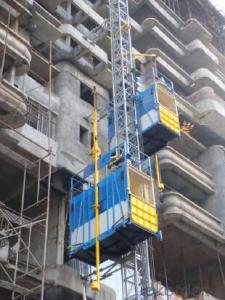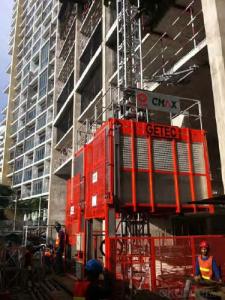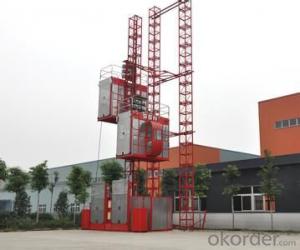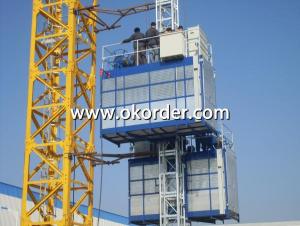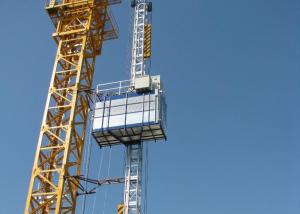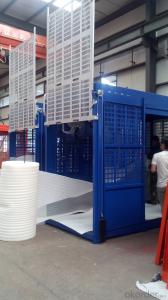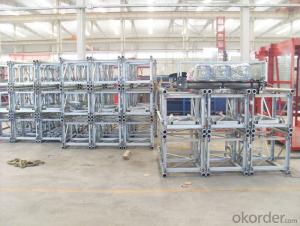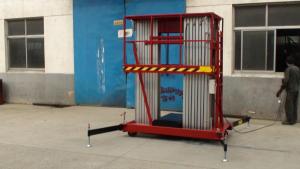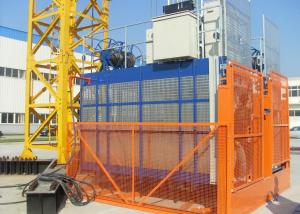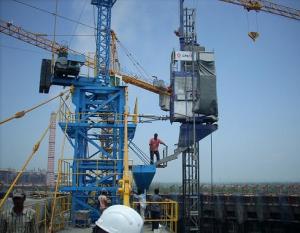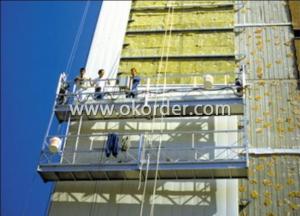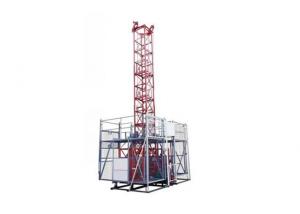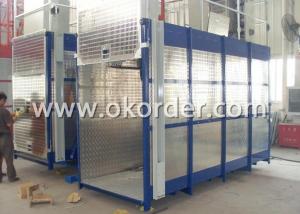Reliable control system building hoist SC200/200BP
- Loading Port:
- Qingdao
- Payment Terms:
- TT or LC
- Min Order Qty:
- 1 unit
- Supply Capability:
- 10 unit/month
OKorder Service Pledge
OKorder Financial Service
You Might Also Like
The construction hoist product produced by CMAX has achieved internationally advanced level in terms of industrial design, control and the drive performance, as well as the operation safety and comfortableness. And CMAX is also making efforts to keep improving the product, as what the construction hoist lifts is not only people and material, but also a kind of social responsibility and service concept…
The new generation SC series of construction hoists adopt modular structure, ergonomic design and advanced manufacturing technology, thus the adaptability and reliability of the product is greatly improved, e.g. the max. lifting height can reach 300 meters. The product adopts multiple patented technologies, reaches advanced level in China, and the market share in domestic market is increasing year by year. The product has also been exported to overseas countries like Russia, Turkmenstan, Vietnam, etc. winning the confidence of customers of both home and abroad
1. The cage drive system is equipped with buffering device, so the cage moves more stable.
2. The ergonomically designed cage interior improves comfortableness.
3. The unique structural design has applied for patent.
4. The typical technologies ensure the malposition difference of the guide rail.
5. The excellent parts in the industry ensures reliable quality of the machine.
6. Precise assembly and accurate drive.
7. Professional solutions for special projects.
8. The complete safety devices ensures reliable control system.
SC series product also has special design, such as reinforced guide rail with cross-section of 800mm, inclined type, special for cooling tower, etc. All the double cage construction elevator can be changed into single cage type, such as SCD200.
Model | SC200/200 | SC200/200BP | SCD200/200 | SC200/200B | ||
Configuration | Standard type | Frequency conversion | Counterweight type | Export type | ||
Rated load | kg | 2000/2000 | 2000/2000 | 2000/2000 | 2000/2000 | |
Cage size L×W×H | m | 3×1.3×2.2 | 3×1.3×2.2 | 3×1.3×2.2 | 3×1.3×2.2 | |
Passengers | 16/16 | 16/16 | 16/16 | 16/16 | ||
Max.lifting height | m | 150 | 300 | 150 | 150 | |
Max.height of free end | m | 9 | 9 | 9 | 9 | |
Lifting speed | m/min | 33 | 0~60 | 33 | 33 | |
Capacity of small hoist | kg | 200 | 200 | 200 | 200 | |
Std.section L×W×H | mm | 650×650×1508 | ||||
Electric motor | Type | Disc brake electic motor | ||||
Power | kW | 11×3/11×3 | 11×3/11×3 | 11×2/11×2 | 11×3/11×3 | |
Speed limiter | Action speed | m/s | 1.2 | 1.45 | 1.2 | 1.2 |
Rated brake load | kN | 40 | 40 | 30 | 40 | |
Model | SCD200/200B | SC100/100 | SCD200 | ||
Configuration | Counterweight type | No counterweight | Counterweight type | ||
Rated load | kg | 2000/2000 | 1000/1000 | 2000 | |
Cage size L×W×H | m | 3×1.3×2.2 | 3×1.3×2.2 | 3×1.3×2.2 | |
Passengers | 16/16 | 12/12 | 16 | ||
Max.lifting height | m | 150 | 150 | 150 | |
Max.height of free end | m | 9 | 9 | 9 | |
Lifting speed | m/min | 33 | 33 | 33 | |
Capacity of small hoist | kg | 200 | 200 | 200 | |
Std.section L×W×H | mm | 650×650×1508 | |||
Electric motor | Type | Disc brake electic motor | |||
Power | kW | 11×2/11×2 | 11×2/11×2 | 11×2 | |
Speed limiter | Action speed | m/s | 1.2 | 1.2 | 1.2 |
Rated brake load | kN | 30 | 30 | 30 | |
The above parameters are subject to change without prior notice, please refer to the actual product.
Note: Both cage size of 3×1.3×2.2 and 3.2×1.5×2.4 are available for of each model (Excl. export type).
- Q: This question asks for a comparison of the pros and cons of utilizing hydraulic cylinders in the context of building hoists.
- <p>Hydraulic cylinders in building hoists offer several advantages, including high force output, compact size, and precise control. They provide smooth and controlled lifting, which is crucial for heavy construction materials. Additionally, hydraulic systems can generate large amounts of force with relatively small cylinders, making them space-efficient. The disadvantages include potential leaks, which can be hazardous, and the need for regular maintenance to ensure the system's reliability. Hydraulic systems can also be more complex to install and repair compared to electric or manual systems. Furthermore, they require a constant power source, which might not always be readily available on construction sites.</p>
- Q: How many guides are in the construction elevator
- 1 guide frame is 1508cm, the highest can be 400 meters
- Q: Is the elevator detail a construction plan? Do you have a detailed picture of the elevator?
- The construction diagram of the elevator appears to be a qualified elevator construction unit
- Q: What factors should be considered when selecting an appropriate building hoist for a specific construction project?
- <p>Choosing a suitable building hoist involves assessing several factors: the weight capacity required, the frequency of use, the height and number of floors in the building, the size and shape of materials to be lifted, and safety features. Consider the hoist's speed and efficiency, as well as its ease of installation and maintenance. Consult with hoist manufacturers or experts to ensure the hoist meets local safety regulations and fits the project's specific needs. Always prioritize safety, reliability, and compatibility with the construction workflow.</p>
- Q: What are the benefits and drawbacks of utilizing a building hoist in construction?
- <p>Advantages of using a building hoist include increased efficiency in material transportation, reduced manual labor, and improved safety by minimizing the risk of accidents associated with manual handling. They can also speed up construction timelines by allowing for continuous material flow. Disadvantages include the initial cost of the hoist, the need for regular maintenance, and potential downtime in case of mechanical failure. Additionally, building hoists may have limited capacity and may not be suitable for all types of construction projects, especially those with irregular shapes or limited space for installation.</p>
- Q: This question asks for the process of changing the speed at which a building hoist cylinder operates.
- <p>Adjusting the speed of a building hoist cylinder involves several steps. First, ensure the hoist is turned off and disconnected from power. Check the manual for the specific model to understand the speed control mechanism, which could be a variable frequency drive (VFD), a governor, or a throttle control. If it's a VFD, adjust the frequency setting to increase or decrease speed. For a governor, you might need to change the spring tension or adjust the control valve. With a throttle control, simply turn the throttle to the desired speed setting. Always test the hoist at low loads first to ensure the adjustments are safe and effective before using it for heavy loads.</p>
- Q: What are the essential maintenance tasks and checks required to keep a hydraulic building hoist in good working condition?
- <p>Regular maintenance of a hydraulic building hoist is crucial for safety and efficiency. Key requirements include inspecting and lubricating moving parts, checking for leaks in hydraulic lines and seals, ensuring the hoist's load limit is not exceeded, and verifying the operation of safety devices like limit switches and emergency stops. Additionally, the hydraulic fluid should be checked for contamination and changed as needed, typically every 1000 hours of operation or annually. The electrical system should be inspected for any damage or wear, and all controls should be tested for proper functionality. A thorough inspection by a qualified technician is recommended at least once a year to ensure all components are in compliance with safety standards.</p>
- Q: Is it possible to use two lifting devices simultaneously to lift an object that is heavier than the maximum weight each device can handle individually?
- <p>Yes, two lifting devices can be used together to lift a heavier object than either one can handle alone, provided that both devices are capable of supporting the combined weight and are properly synchronized. This requires careful planning and coordination to ensure the safety of the operation and the integrity of the lifting devices. The total weight capacity of the combined system should be greater than the weight of the object being lifted, and the devices must be designed to work in tandem without overloading or causing damage.</p>
- Q: This question asks if improper functioning or lack of maintenance in hydraulic cylinders can lead to damage.
- <p>Yes, hydraulic cylinders can cause significant damage if they malfunction or are not properly maintained. Malfunctions can lead to leaks, component failure, or even structural damage due to pressure surges. Lack of maintenance can cause wear and tear, leading to reduced efficiency and potential failure. Regular maintenance, including checking for leaks, ensuring proper lubrication, and replacing worn parts, is crucial to prevent damage and ensure the safe operation of hydraulic systems.</p>
- Q: Helped wall bar how to set up, and several layers of set a, two width, wall rod need a few meters long, what shape is the embedded parts, how much of a steel bar, Angle and wall vertical or have?
- In the construction preparation stage, must first be familiar with the steel stair construction drawing and construction drawings of embedded object, combined with the site construction conditions, to understand the distribution of the embedded parts of this project, form, and according to the construction characteristics of the project construction scheme of embedded object, technical disclosure, etc.
Send your message to us
Reliable control system building hoist SC200/200BP
- Loading Port:
- Qingdao
- Payment Terms:
- TT or LC
- Min Order Qty:
- 1 unit
- Supply Capability:
- 10 unit/month
OKorder Service Pledge
OKorder Financial Service
Similar products
Hot products
Hot Searches
Related keywords
